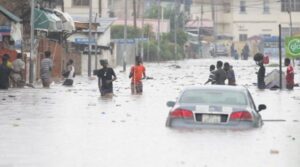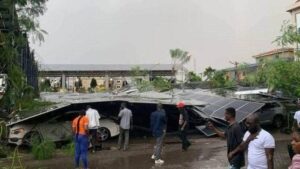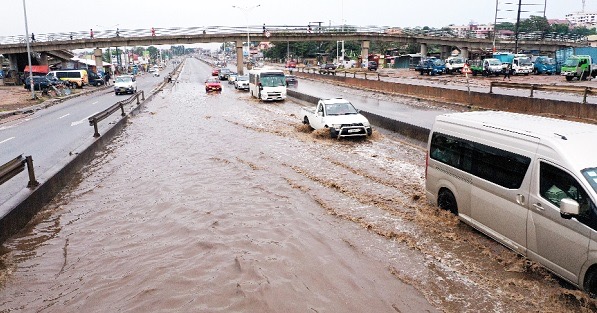Another downpour. Another flooded street. Another life upended.
If you’re Ghanaian, this isn’t just weather news – it’s a terrifyingly familiar script. The first heavy rains hit, smelling of fresh earth and promise… only to swiftly morph into a nightmare of swirling brown water, collapsed buildings, lost livelihoods, and heartbreaking headlines. “Floods Claim Lives in Accra.”Kumasi Submerged.” Major Roads Impassable.” It feels like a day, drenched in trauma.
We know this story. We live it. Year. After. Year.
We brace ourselves as the clouds gather, not with hope for nourishing crops, but with dread for what the deluge will steal this time. Will it be the market woman’s entire stock washed away in minutes? The schoolchild swept off a broken bridge? The family watching their home – their life’s investment – crumble into mud? The commuter spending hours in what feels like a lake, not a road?

This isn’t just “rainy season.” This is a national emergency on repeat.
Much of this destruction isn’t just an act of nature. It’s amplified by our own hands and our collective failures:
The Gutters meant to channel water transformed into landfills by plastic waste and indiscriminate dumping. When the rain comes, it has nowhere to go but everywhere.
Desperation and lax enforcement see homes and businesses rise in waterways and floodplains, sitting ducks for the inevitable surge.
Drains are inadequate, poorly maintained, or simply non-existent in critical areas. Roads dissolve. Bridges weaken.

We excel at heroic rescues and moving speeches after disaster strikes. But the sustained, preventative action? The long-term drainage projects? The strict enforcement of building codes? Too often, it feels like whispers drowned out by the next storm.
This is a heartfelt plea, not just to the powers that be, but to every single one of us:
To Leaders & Planners: Enough bandaids. We demand visionary, implemented solutions – massive drainage projects, sustainable urban planning, strict enforcement, and real climate adaptation.
Prioritize prevention over press conferences. Invest in infrastructure like our lives depend on it – because they do.
To Ourselves (Yes, Us): That sachet, that plastic bottle – it does matter where it ends up. Building or buying in that appealingly cheap floodplain? It’s a ticking time bomb. We must be part of the solution. Clear our gutters and dispose of waste responsibly.
Let’s channel our famous Ghanaian ingenuity and community spirit proactively. Support neighbourhood clean-ups, check on vulnerable neighbours when forecasts look grim, and hold authorities accountable before the floods hit.
The rains will come. They always do. But the scale of destruction doesn’t have to be our destiny. This isn’t just about water; it’s about wasted potential, shattered dreams, and lives cut short.
We are tired of being resilient survivors of a predictable tragedy. We deserve to be thriving citizens in a prepared nation. Let this season be the catalyst for real change. Let our tears be of relief, not grief, next time the skies open.
Share your stories (safely!). What have you witnessed? What solutions do you see?
E.A-B Kelzi




